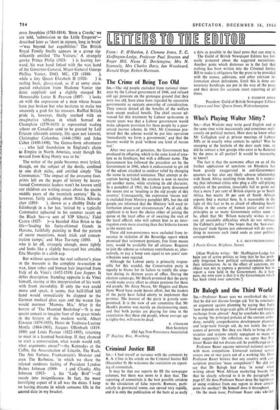Dr Balogh and the Third World
SIR,—Professor Bauer says we overlooked the fact that he did not discuss foreign aid. Yet he concludes an argument against planning by saying that India 'now depends on large-scale gifts of food and foreign exchange from abroad.' And he concludes his article by saying 'the principal policies of the current ortho- doxy, notably comprehensive development planning and large-scale foreign aid, do not tackle the root causes of poverty. But they are likely to bring about societies and systems utterly repugnant to many of their supporters' On reflection, we agree that Pro- fessor Bauer did not discuss aid; he pontificated on it Professor Bauer equates universal national service with mass compulsion. Universal national service covers one or two years out of a working life. Does Professor Bauer believe that any country with con- scription practises 'mass compulsion'? We did not say that Dr Balogh had Asia 'in mind' when writing about West African marketing boards but that he clearly referred to it in the paragraph on page 67. Or does Professor Bauer deny the legitimacy of using evidence from one region to draw conclu- sions for another? He himself does it throughout.
On the main issue, Professor Bauer asks whether
we 'argue that contact with Europeans has retarded the development of India, China and Indonesia?' All we did was to show that the evidence is not consistent, with Professor Bauer's view that 'throughout the underdeveloped world the most rapidly advancing areas have, for decades, been those with which the developed countries have established contacts, while the poorest and most backward are those with few external contacts or none ' Nor is the evidence consistent with the statement that 'international inequality reflects, but does not cause, differences in economic performance. ...' Pro- fessor Bauer ignores the difficulties raised by health before growth; by the transfer of ill-adapted advanced technologies and social institutions; by the pull on the salary structure exercised by an inter- national market in scarce skills; by the development of synthetic substitutes for many primary products exported by poor countries; and even by the damag- ing impact of outdated doctrines.
PAUL STREETEN ROGER HILL
The Institute of Development Studies, The University of Sussex, Fainter, Brighton, Sussex































 Previous page
Previous page